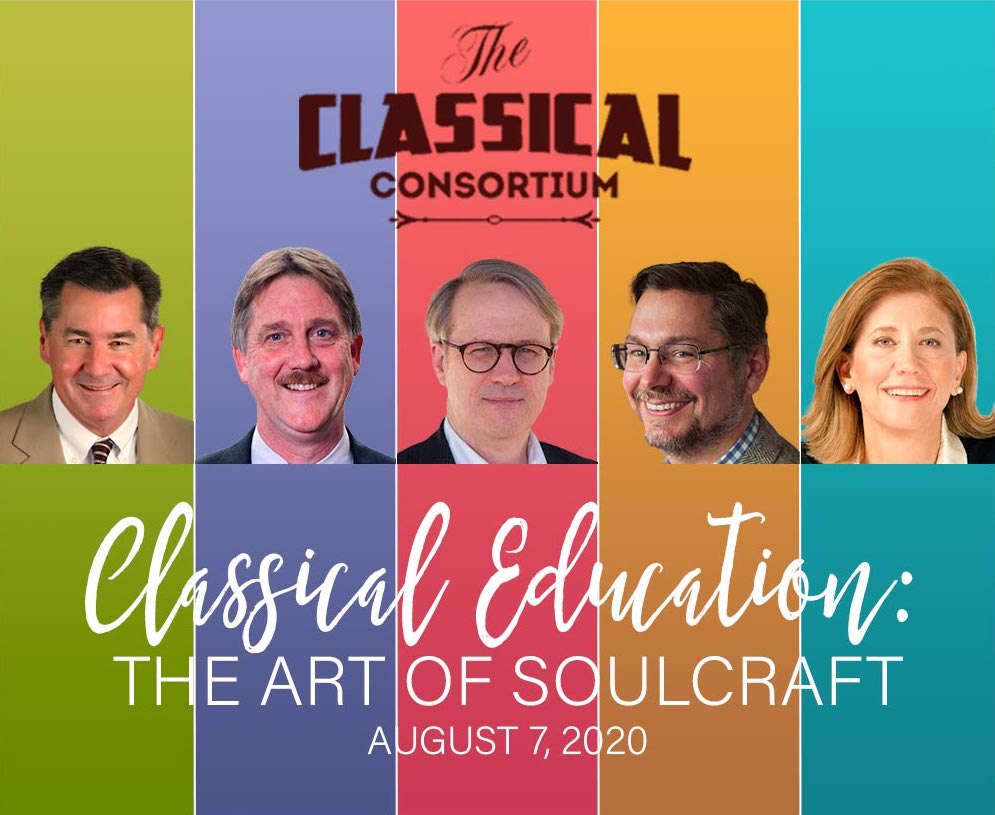Our major conference “The Art of Soulcraft” is tomorrow, August 7, 10 a.m. to 8:30 p.m. EDT. Registration is free.
Christopher Perrin came up with the title for this one-day conference—at least I think he did. Such words vibrate with Perrin’s marvelous predilection for quiet, probing ideas.
O how I enjoy the different ways of thinking and teaching expressed by this group of colleagues: Perrin’s quiet well of knife-sharp ideas; Martin Cothran’s crystal clarity and wry wit; Andrew Pudewa’s striking challenges issued with his signature blend of courage and humility; Andrew Kern’s strong, yet mystical journeys along the path of Truth. How glad I am to have met each of these men. And how exciting it has been join with them, and all of you dedicated, talented folk who labor in this movement to recover the standards of learning that once built our Western culture.
 So do join us for our last blast, end-of-summer festival on August 7. We will offer two panels and each of us will give a talk. My presentation, not surprisingly, will focus on how and why we judge music and create what is known as the “canon” of Classical music. Even if your schedule is too busy to join us live (and, yes, things are getting busier), the free registration will bring you access to a recorded form of the conference.
So do join us for our last blast, end-of-summer festival on August 7. We will offer two panels and each of us will give a talk. My presentation, not surprisingly, will focus on how and why we judge music and create what is known as the “canon” of Classical music. Even if your schedule is too busy to join us live (and, yes, things are getting busier), the free registration will bring you access to a recorded form of the conference.
Beyond that event, I would like to extend an invitation to some new things we are doing here at Professor Carol, presented below. These sessions are coming about largely because my thoughts are fixed on the countless families who, suddenly, with wringing hands, need to figure out the next step in their children’s education.
For homeschooling families, Fall Semester 2020 will look as it always does. Spring semester proceeded and ended as expected, albeit with a few extra people in some households. Summer brought fewer structured events, but perhaps more fun. Now August’s heat and shortening days trumpet the message that classes loom, starting on whichever day the family appoints.
For students in most private schools, a regular and much longed-for pattern gratefully is about to arrive. Strange new rules may apply, but the welcome rhythm that tidies up summer’s malaise will plop into place. (“Make lunch. Set the clock. Get in bed, Ding-ding-ding, Up, up, up. Toast, teeth, tidy. Out the door!”)
But for so many families, an extension of an amorphous, still-strange world of on-line public schooling awaits. Disappointment and worry is rampant. Not surprisingly, registration at the well-established virtual academies long used and beloved by students and educators is up many-fold.
We know that a primary key to a child’s education has always been the enthusiastic devotion to learning evidenced by the adults around him. This fact alone causes the anxiety in parents who, for all kinds of reasons (starting with the demands of their jobs) are not in a good position to supervise their children’s schooling. On the other hand, many of these same parents are seeing the tantalizing possibilities of restoring into their children’s education the best that schooling once routinely offered: the arts, penmanship, Latin, logic, rhetoric, effective programs in mathematics and the sciences, and a far more vital and engaging approach to history and literature. Where this all will lead, no one yet knows. But it is a cataclysmic moment in our society, that is for sure.
Those of us engaged in the renewal of education need, and want, to provide support to those entering this new adventure of learning and teaching. Consequently, we here at Professor Carol are offering a bigger slate of events. I will be inaugurating a series called “A Sprint Through [Topic]” on August 18 with A Sprint through Russian History. A new series on Art History and Ideas of Cultural History will begin in September.
Our popular Night at the Opera will continue on August 11 with Engelbert Humperdinck’s Hansel und Gretel—a gorgeous musical drama. And yes, while it’s a good opera for children, expect to discover far more than a children’s opera. Audiences of its time hailed it for extending the vital ideas, musical and otherwise, set forth by Romantic composers like Wagner, including the ever-powerful concept of Redemption.
This very week began a new series this week of Hymn Workshops. All this supports our regular (and growing) line-up of courses.
As always, I invite you to write me with your questions and ideas. Our community of scholars and enthusiasts is growing. All of us have a role to play, whether we have school-aged children in our lives or not. And all of us will benefit from the energy and enthusiasm that is sprouting up—often in the most unlikely of gardens.



